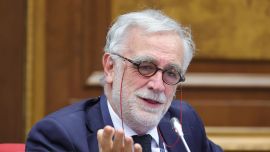“If he’s going to ask me to invest, then I’d tell him to man up and run the country,” an angry Eduardo Eurnekian, one of Argentina’s leading and richest businessmen, told reporters outside a conference where President Javier Milei had just given one of his usual messianic speeches this week.
Warned by reporters that the President would probably hear his comments, Eurnekian – who employed Milei for years and is credited with being “the creature’s father” – responded as anyone in his position would: “What the hell do I care?” At 91, Eurnekian has emerged as a primus inter pares within “The Six” – a group of Argentine businessmen that represent some of the most important sectors of the economy that isn’t in international hands including the industrial, agricultural, commercial, construction, financial, and banking sectors.
These facts give Eurnekian’s words particular weight when referring to the government’s macroeconomic policy. Given the personal relationship and the respect he commands from the business elite, the billionaire’s complaints could be read as a sort of collective response to the idea (generally reiterated by Milei and Economy Minister Luis ‘Toto’ Caputo) that the Argentine business sector is now responsible for dragging the economy out of a ditch after the national administration has achieved some sort of macroeconomic stability.
The Milei administration is currently in the midst of a transition period of sorts, where it has laid out the broad strokes of its plan, which includes a major economic and cultural restart of the nation. It has managed to implement an important portion of it but has crashed against a wall in other regards, and is still waiting to reap what it has sown where it believes it has been successful. The surprise libertarian victory in the presidential election has thrown the political class, known as “the caste” in Milei’s lingo, into absolute disarray, giving La Libertad Avanza the upper hand in its cultural battle against anything that isn’t represented by their narrow anarcho-capitalistic, libertarian worldview. By associating his political crusade with anti-Kirchnerite thought, Milei has managed to absorb a substantial portion of the opposition, creating a new version of “la grieta” that is clearly visible in the ongoing legislative battles where even the moderates are forced to take position or face the digital slaughterhouse.
This cultural battle is probably one of the most important elements of Milei’s messianic leadership, in which he must destroy the “lefties” and anyone associated with the state in any way, from human rights organisations to the public university system. State-owned companies must be privatised and public works projects shut down regardless of their own merit, or lack thereof. Profit and the will to survive and impose oneself on reality are the maxims that trump any sort of social assistance or consideration for the less fortunate. The cultural war resonates because it is littered with truths, even if partial, of the abuse of the state and the protection it offers to the less fortunate. It is fought out on the Internet, where the synthetic power of Milei and his “heavenly forces” have proved superb at digital battling. And this war is international, resonating across the globe as the current paradigm of financialised capitalism, just as the politically correct welfare state of the post-war era has been completely exhausted. Rather than fixing what is broken, Milei wants to incinerate it and build anew.
Argentina’s President has achieved international projection as none of his predecessors have before. Leaving Alberto Fernández out of it, Maruicio Macri was extremely popular abroad, to the point where he was dubbed the “slayer of populism” by the Anglo-Saxon media. Argentina was lent billions of dollars (with Toto Caputo in charge of the Finance Secretariat) as the United States and Western Europe finally shrugged off the annoyance of the Kirchners, particularly Cristina. Previously, Fernando de la Rúa was insignificant for the world while it was Carlos Menem, another eccentric right-wing populist, who achieved some sort of international fame. Milei is on another level and has become the standard bearer of the culture war against ‘wokeism.’ But while he counts on the support of the Northern Hemisphere’s elites, exemplified by hedge funder Stan Druckenmiller and billionaire Elon Musk, he still hasn’t managed to secure any serious funding, either from the private sector or multilateral institutions like the International Monetary Fund. If Donald Trump makes it to the White House, Milei’s position will be substantially strengthened.
There should be few doubts as to why Milei has spent so many days abroad, clocking in 670 daily kilometres in international travel since taking office mere five months ago (more than two times the circumference of the Earth). At home, he isn’t revered as the messiah, he must rather deal with the mundane world of politics, which he despises. His marquee ‘Ley de Bases’ bill is being pulled apart in the Senate, meaning that it will be impossible for the president to sign it into law before the politically relevant and self-imposed May 25 deadline, on which Milei wanted to ink the ‘Pacto de 25 de Mayo.’ Having been forced to split the law into at least two bills, the libertarian administration is learning how Congress works the hard way, forced to water down its ambitious reform agenda and negotiate with some of its sworn enemies, including the Unión Cívica Radical (UCR) led by Martín Lousteau in the Senate. Much like in the Chamber of Deputies, what appeared to be an easy vote turned into an arduous battle where the government’s inexperience and lack of flexibility ultimately played against them, giving their political opponents easy wins despite failing to erode Milei’s public image.
It is surprising that, given the depth of the proposed austerity, the President has retained solid figures in opinion polls. In great part it has to do with the perception that the deceleration in inflation will continue, something that divides economic analysts. The importance of the budget surplus, which Milei and Caputo have put forth as the cornerstone of their economic plan, together with the exchange rate policy have helped jumpstart expectations, as the value of Argentine stocks and bonds, together with the contained peso-dollar rate, indicate. Scepticism as to how long this situation can be sustained macroeconomically anger the president, who ranted against his economist colleagues this week for suggesting the peso is artificially overvalued. A sudden devaluation could mark the beginning of the end of the financial honeymoon this government is building its image on. It happened very quickly in 2017, and by the time Macri noticed what hit him, his administration was in full crisis mode.
Yet, as the City is reaping benefits, common folk are struggling. Unemployment is clearly on the rise, particularly in the labour-intensive industrial sector which has been relegated from to priority in Peronist years to the back of the line with the libertarians. Formal labourers have seen the erosion of their purchasing power hit aggressively, forcing difficult life changes. Private education and healthcare become increasingly unaffordable, as does general consumption including putting food on one’s table. Beef consumption, for example, has plummeted, as the share of chicken and pork has grown. In the land of the asado, beef consumption fell 17.6 percent in the first quarter to the lowest level in 30 years, one of the lowest figures in the historical dataset, according to the CICCRA industry chamber.
Even before Milei took office, forecasters suggested his inexperience, lack of political structure, and the depth of the economic crisis would topple the government in the first quarter. Not only has that not happened, the President appears to be in control of the economic variables he cares about, while retaining popular support. While being a child of polarisation, he is beginning to create a rift within sectors traditionally aligned with his ideological creed, namely mainstream businessmen.
Milei and Caputo must keep drawing rabbits from the proverbial hat while guaranteeing the sustainability of their policies in order to avert a new shock in confidence.




















Comments